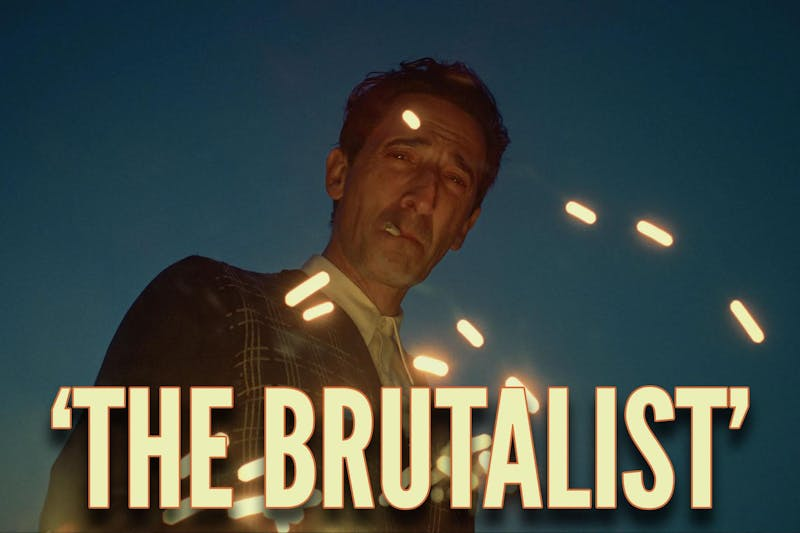I’ve always been fascinated by the concept of the “Great American Novel” — the idea that a single work can encapsulate the spirit and essence of our country. It’s a daunting challenge, yet books like “The Great Gatsby” and “Infinite Jest” have achieved it, offering insights into America that are both poignant and harrowing. But can a film achieve this same impact? If any film could, it would be Brady Corbet’s “The Brutalist,” which feels like an adaptation of a Great American Novel that was never written. Colossal, beautiful and profound, the film deconstructs America and exposes the perennial brutality at its core.
“The Brutalist” is grandiose and utterly convinced of its own greatness. From its nearly four hours runtime to title cards denoting an overture, two acts, an intermission and an epilogue, the film’s lofty presentation signals Corbet’s desire to be in the pantheon of greats. And while all of this could easily come off as pompous, the film kind of earns its swagger. It tells the story of László Tóth, a Hungarian-born Jewish architect who emigrates to America after surviving the Holocaust. After settling in Pennsylvania, he meets Harrison Lee Van Buren, a wealthy WASP industrialist (yes, him being named after two U.S. presidents is kind of blunt and silly, but it works!). Harrison takes a keen interest in László’s architectural skills and commissions him to build an enormous community center in honor of his late mother, but the project’s scale and intensity slowly unravel the two men.
“The Brutalist” is astonishingly dense, making it challenging to sift through all of it fully. It incisively highlights many issues in America surrounding capitalism, immigration and art, often drawing intercorrelations between them. To analyze all of it would require a lengthy treatise, so I’ll just say I especially loved the themes of the precarious relationship between art and capital, the exploitation of immigrants, the transactional nature of assimilation, philanthropy as moral laundering and some very bravely ambivalent commentary on Zionism that will not cleanly please either side of the debate. There is probably more I didn’t even pick up on my first watch, but that’s what makes the film so brilliant. It’s overflowing with ideas and dialectics, making it a profoundly rewarding experience that sticks with you long after its confounding epilogue, which I’m still trying to unpack.
Beyond its rich storytelling, the film is formally breathtaking. The gorgeous cinematography brought to life by VistaVision stock renders the film lush and vibrant; costumes, skin tones and environments pop off the screen. The set design is sumptuous, looking far better than a $10 million film has any right to. The sprawling construction sites and László’s austere designs are captured stunningly. Corbet is also magnificent behind the camera, deftly alternating between eerie precision and mystifying opacity. Though sparse in what it reveals, the film’s final chase sequence is profoundly devastating based solely on the expert craftsmanship of its direction and editing; it’s an absolute masterclass.
I’m ashamed of this, but I usually don’t give much thought to a film’s score. I consider most scores serviceable and simply focus on other elements of a film. However, this film is the exception; Daniel Blumberg’s score is too phenomenal to ignore. It’s towering, ominous and abrasive. His unique use of brass and percussion heightens the mood of every scene in the film and explodes through the speakers during key moments. I absolutely love it.
I can’t believe I’ve gone this long without praising the film’s acting performances, but there’s just so much to discuss. Adrien Brody is entrancing as László. He’s a melancholic enigma throughout the film, and Brody conveys a latent depth to the character. Guy Pearce as Harrison is terrific and frequently hilarious. Nevertheless, his disarming charm conceals a deeper darkness that leaks out throughout the film in bouts of rage. He and Brody have a rich dynamic throughout the film as both men push each other to their limits. And the most surprisingly good performance of the film came from Joe Alwyn, who plays Harrison’s buffoonish son. I’ve never been very impressed with an Alwyn performance, but he adeptly plays what is essentially a pathetic impersonation of Pearce’s character, with convincing affability replaced with insecure posturing.
While I’ve been gushing endlessly about this film, I should qualify my praise by saying that the second act is kind of a mess compared to the impeccable first half. It stumbles under the weight of its own narrative ambition and occasionally devolves into aimless meandering, cheap provocations and unimaginative cliches. Specifically, there’s one shocking scene (if you’ve seen the film, you know exactly what I’m talking about) that is such an infantile, over-the-top literalization of one of the film’s themes that I felt insulted. Nevertheless, there’s still a lot of good stuff in the second half. So overall, I think Corbet succeeds at his grand ambitions: he has crafted a compelling modern American epic rich in mood, ideas, and scope. It is a Great American Film.

